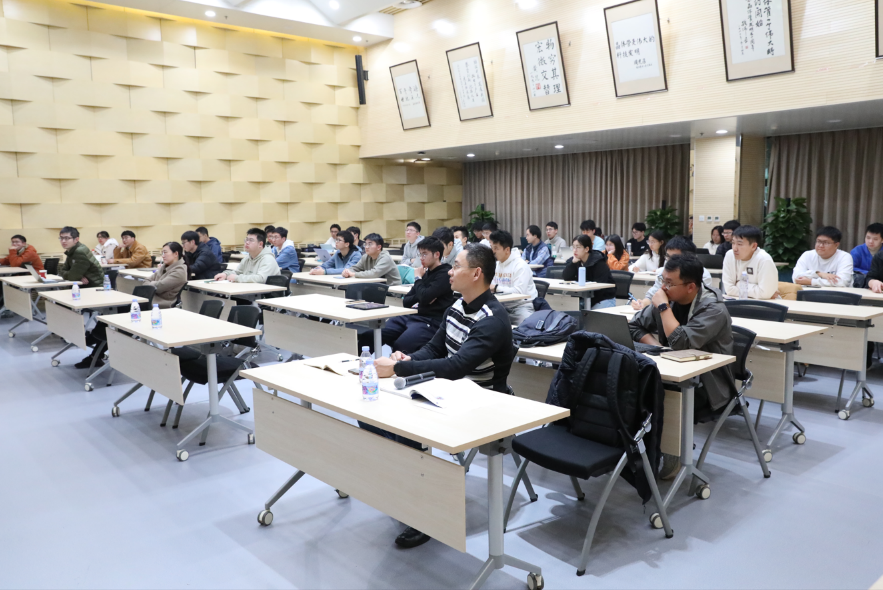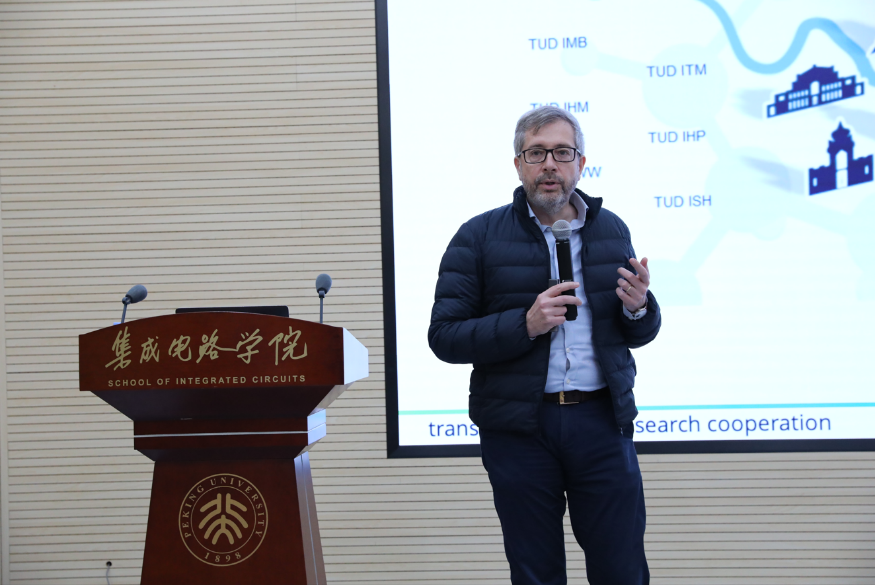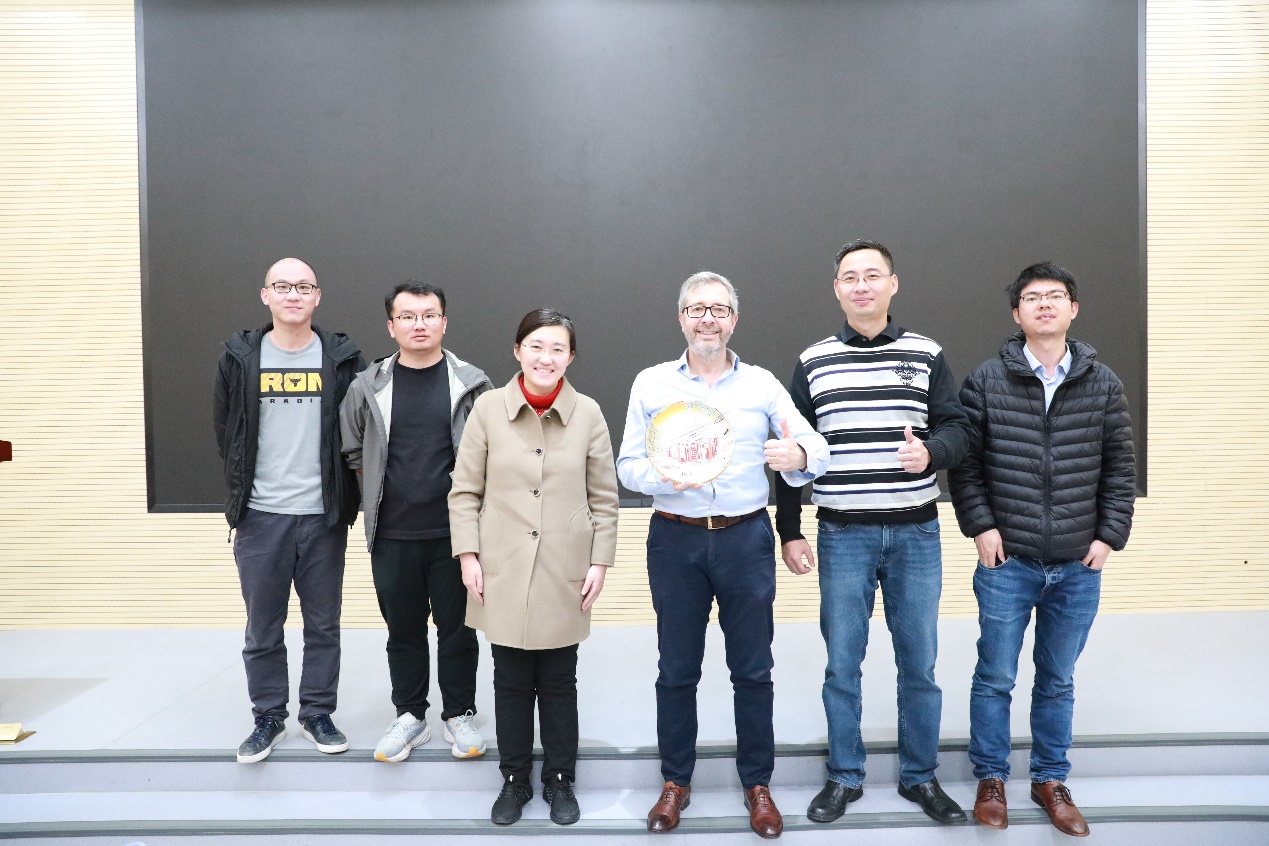10月26日下午,由新葡的京集团3512vip官网、新葡的京集团3512vip官网高精尖创新中心、新葡的京集团3512vip官网国家集成电路产教融合创新平台、集成电路科学与未来技术北京实验室、新葡的京集团3512vip官网校友会半导体分会联合主办的“未名·芯”论坛系列讲座第五十期在微纳电子大厦103报告厅成功举办。本期论坛由王玮教授邀请到德国德累斯顿工业大学(TU Dresden)材料科学与纳米技术研究所讲席教授GianaurelioCuniberti院士,带来题为“Machine Learning for Molecular Sensing”的精彩讲座。讲座由新葡的京集团3512vip官网王路达研究员主持。

讲座伊始,Cuniberti 教授与参会人员进行了亲切互动,对德累斯顿工业大学的研究体系进行了详细介绍。德累斯顿拥有众多顶级的工业基地和研发机构,作为德国材料科学研究中心,对多种材料体系和应用领域的研究在世界上处于先进水平,尤其是基于计算和数据驱动的材料研究方法。在先进的科研条件和浓厚的科研氛围的支持下,Cuniberti教授多年从事材料科学与智能传感材料领域的研究,在材料科学、微纳制造技术、人工智能及其交叉领域取得了丰厚的研究成果。

报告中,Cuniberti 教授以材料学科的发展趋势作为切入点,将其划分成三个重要阶段,论述了人工智能在当代材料研发中的重要地位。Haber-Bosch人工合成氨技术的发明与工业应用过程代表了从自然界中合成制备材料的发展阶段,以芯片技术为基础的信息产业的发展则代表着利用材料存储、传递信息的另一个发展阶段,到如今,材料研究正在步入信息技术辅助材料设计、制备的新发展阶段。自然界利用四种碱基衍生出各种生物,而人力远不及自然界,利用目前已知的118种元素组成材料的可能性,并非人力所能遍历。随着计算成本的降低,利用人工智能辅助设计新的纳米材料成为学科发展的必然趋势。
接着,Cuniberti教授从电子出发,基于最基本的物理方程,讲述了原子之间如何结合形成分子。利用这些基本的物理规律,借助高通量计算,Cuniberti 教授团队从大量的分子数据库中,经过几何构型优化、电子结构和原子振动频率计算等筛选能够符合预期性能并稳定存在的结构,合理设计并制备出了许多新的纳米材料。
随后,在材料设计制备的基础上,Cuniberti教授进一步从工程的角度,探索将新的纳米材料推向实际应用。Cuniberti 教授讲述到,对于动物的五大感官,现有传感器的视觉、听觉和触觉感知能力已经能和自然界相媲美,但在嗅觉和味觉这两方面的感知能力却稍显逊色,其传感原理涉及物理和化学传感。针对嗅觉这一缺失的感官,Cuniberti教授团队提出基于新型纳米材料的嗅觉传感器,利用功能化纳米材料制成纳米传感器并集成到多通道气体传感器设备中,在暴露于各种气体时记录它们的传感信号,并采用机器学习算法从中提取特征模式,从而实现对特定气体的识别。机器学习的集成显著提高了电子嗅觉系统在各种气体中的气体识别性能。该创新平台不仅缩小了电子鼻的尺寸,而且还将嗅觉信息数字化,从而能够精确检测和识别各种气体和挥发性有机化合物,推动环境监测、病原体检测和疾病诊断等领域的创新应用。

讲座结束后,Cuniberti 教授就嗅觉传感器的数字化、循环稳定性、响应时间、对不同气体种类和浓度识别的准确性、在早期疾病诊断中的应用等问题与现场师生进行了深入交流探讨,就热情和团队合作在科研中的重要性分享了自己的见解,为在场师生带来了鼓励和深刻启发。随后,Cuniberti 教授及其团队课题组组长黄时荣博士与王玮教授团队张盼博士进行了深入交流,探讨了未来合作方案。
个人简介:
Professor Gianaurelio Cuniberti holds since 2007 the Chair of Materials Science and Nanotechnology at the Technische Universität Dresden (TU Dresden) and the Max Bergmann Center of Biomaterials in Dresden, Germany. He is a member of the TU Dresden School of Engineering Sciences (Materials Science) and of the School Science (Physics). He was visiting scientist at MIT and the Max Planck Institute for the Physics of Complex Systems Dresden. From 2003 to 2007, he was the head of a Volkswagen Foundation Research Group at the University of Regensburg, Germany. His research activity is internationally recognized in more than 400 scientific journal papers to date. He initiated and organized numerous workshops, schools, and conferences and took part in international research training networks, offering extensive opportunities for young scientists. He has given plenary and invited talks at numerous international meetings. He serves as a referee for numerous high-impact journals, and for several funding research institutions including among others the EU, the German Science Foundation (DFG), the USA National Science Foundation (NSF), the German Israeli Foundation (GIF), and the Alexander von Humboldt Foundation. He received several talent scholarships and awards including the Max Planck Society Schloeßmann award (2001) and the VolkswagenStiftung Research Group Individual Grant (2003). He is a member of several scientific organizations and a corresponding member of the Umbrian Academy of Sciences. Gianaurelio Cuniberti is an Honorary Professor at the Division of IT Convergence Engineering of POSTECH, the Pohang University of Science and Technology since 2009, since 2011 Adjunct Professor for the Department of Chemistry at the University of Alabama, and since 2019 Guest Professor at SJTU. In 2018 he became a faculty member of the transcampus between TU Dresden and King’s College London. Professor Gianaurelio Cuniberti is an elected member of the European Academy of Sciences, of the Academia Europaea and of the Germany National Academy of Science and Engineering (acatech).